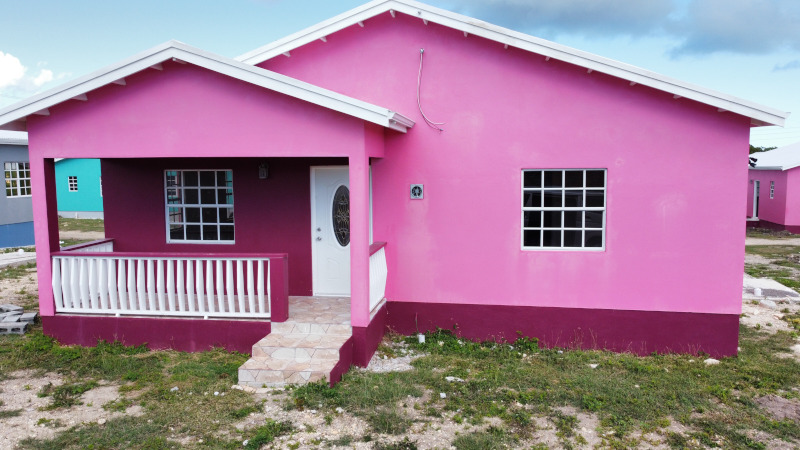Central Housing and Planning Authority (CHAPA)
Blueprints for Tomorrow: CHAPA’s Visionary Approach to Housing in Antigua and Barbuda
Revolutionizing affordable housing and community development while blending innovative construction with financial education and sustainable community initiatives.
CHAPA, the Central Housing and Planning Authority, has firmly established itself as a leader and driving force in the real estate sector of Antigua and Barbuda. At the heart of its mission, CHAPA is dedicated to offering affordable housing and land allocation, focusing on serving a broad spectrum of the population, with particular attention to supporting low-income citizens in achieving homeownership.
Offering an insightful look into Antigua’s evolving housing sector, Carl Christopher, Chairman of the Board of Directors at CHAPA, highlights a dynamic shift in the island’s economic and social fabric. “Housing is pretty much booming,” he asserts, depicting a nation where construction is a driving force of progress. This growth, according to Christopher, is closely linked with government initiatives aimed at making housing more accessible and affordable.
Describing the bustling construction as a key element in Antigua’s economy, Christopher points out, “If you’re not from Antigua and you travel here, seeing all the construction, you would understand the housing market is on the uptick in Antigua, and it has been for a few years.” This increase is significant not just in numbers but also in its transformative impact on the economy, challenging tourism as the island’s economic mainstay.
The housing boom, as Christopher elaborates, represents a profound cultural and generational shift. “A lot of younger folks are seeing that homeownership is possible and are starting to think along those lines,” he notes, indicating a significant change from previous generations’ approach to homeownership. This change is evident in the tangible aspirations of Antigua’s youth. “You find people in their mid to late twenties going into banks to think about mortgages,” he observes. This shift from prioritizing dream cars to homes and land signifies changing priorities among the younger population.
But the change is not just about quantity. Quality has also become a hallmark of Antigua’s housing landscape. “The standard of homes is improving,” Christopher remarks, highlighting the rising expectations for housing quality, even in subsidized projects. This quest for quality, he explains, is deeply rooted in the culture, where people expect good quality and sound structures. “Our people expect good quality, even in subsidized homes,” he notes.
Innovations in Construction and Material Management

Cynthia Laviscount, the Construction Projects Manager
In the quest to make housing both affordable and of high quality in Antigua, Cynthia Laviscount, the Construction Projects Manager, plays a crucial role. Her efforts are pivotal in shaping a housing market that caters to the affordability needs of the population without compromising on the integrity and standards of construction.
Laviscount elaborates on the innovative approaches her department has taken to meet these challenges. “The Construction Projects Department has played a pivotal role in providing the product for the consumers at the point at which they can afford, because affordability is the key,” she states. This focus on affordability, however, does not lead to a compromise in quality. Laviscount emphasizes a strategic approach to maintaining structural integrity while managing costs: “We will not compromise on the structural integrity, but we try to take a better hold of the way we provide the product.”
The process involves a hands-on approach with contractors and meticulous control over material distribution. “We try to reduce wastage,” Laviscount explains, underscoring the department’s commitment to efficiency and cost-effectiveness. This strategy also includes a direct role in controlling the cost of the finished product for homeowners, ensuring that the balance between affordability and quality is meticulously maintained.
Addressing the challenges posed by supply chain disruptions, especially in the wake of COVID-19, Laviscount sheds light on CHAPA’s proactive measures. “We have taken over the supply of materials to the contractors,” she reveals, a move that has allowed the organization to leverage bulk purchasing and discounts. This strategy not only ensures material affordability but also helps in maintaining a steady flow of essential supplies. “We’ve created an inventory department that distributes the building materials to the contractors,” Laviscount adds, detailing the logistical improvements made to streamline the construction process.
These improvements have been crucial, especially considering the rapid pace of construction in Antigua. “Building materials become scarce very quickly… we have been able to stockpile certain essential building materials,” Laviscount notes, highlighting the foresight in managing resources effectively. This approach has been instrumental in reducing downtime in projects, ensuring that the construction boom does not falter due to material shortages.
Expanding the Horizon: New Developments and Challenges
In the evolving narrative of CHAPA’s housing projects, new developments and challenges emerge, each telling a story of progress and perseverance. Laviscount highlights the strides made in various housing projects over the past year, underscoring the organization’s commitment to expanding its reach and impact.
She details several vital projects that CHAPA has embarked on since last year. The Saint Philip’s project, boasting 19 completed homes, stands out as a significant achievement. The Bolens project, with 15 homes, is on track for completion within the year. The Dunbar’s project, catering to the middle-income bracket, is progressing well, with two of the four homes to be turned over by year-end. The Lightfoot development has seen a turnover of 12 homes in the past year. Lastly, the North Sound development, though in its early stages with one home completed, is poised for expansion with about 20 homes planned.
Chairman Christopher reflects on his initial days at CHAPA, recalling his first site visits to these developments. He notes the transformation witnessed in projects like the Saint Philip’s and Bolens developments. Christopher inherited certain challenges, particularly in the Bolens project, which required strategic interventions. Under his leadership, policies were revised, and strategies were implemented, leading to significant progress. He praises the Construction Projects Department for its effective management and execution.
Christopher emphasizes CHAPA’s role as a change-maker in the industry. The organization’s demand for quality in subsidized homes, coupled with the cultural expectations of homeowners, presents a unique challenge. Yet, under Christopher’s stewardship, CHAPA has managed to strike a delicate balance, achieving a remarkable 98% satisfaction rate among homeowners. This balance between quality and affordability is not just a business strategy; it’s a testament to CHAPA’s commitment to its citizens’ aspirations and needs.
Financial Education and Tailored Solutions: A Comprehensive Approach
In an environment where housing and construction are experiencing a boom, CHAPA is actively exploring new initiatives to educate and guide its clientele, particularly the younger demographic, on the nuances of homeownership and financial responsibility. Christopher and Laviscount delve into the organization’s approach towards this crucial aspect.
Christopher shares that CHAPA plans to intensify its efforts in financial education. Recognizing the gap in knowledge among many aspiring homeowners, particularly in understanding what a mortgage entails and how to manage it, he emphasizes the need for public relations strategies that educate rather than merely advertise. “We’ve decided to start moving in the direction of education,” he states, underlining the importance of preparing clients for homeownership. This includes guiding them on financial planning and savings for down payments.
Meanwhile, Laviscount touches upon a critical aspect of CHAPA’s client engagement – customizing housing solutions to fit various budgets. She acknowledges that many clients aspire to what they consider their dream homes but may not immediately qualify for them financially. “We go the extra mile,” she says, focusing on offering homes within clients’ budgets with possibilities for future expansion. As an engineer, Laviscount strongly emphasizes structural soundness, ensuring that even the most budget-friendly homes meet CHAPA’s high standards of quality and safety.
Engaging Private Partnerships for Progressive Development
CHAPA’s approach to housing development is not solitary; it involves strategic collaborations with private entities, which Christopher elaborates upon with keen insight. These partnerships, vital to CHAPA’s operational model, facilitate realizing its ambitious housing projects.
“We have a three-party contract involving the homeowner, ourselves, and the contractor who builds the homes,” he details, illustrating the interconnected nature of these relationships. He further emphasizes CHAPA’s commitment to spreading opportunities across the island, aligning with its mandate of alleviating poverty and supporting local businesses. This approach not only aids in providing affordable homes but also ensures local contractors, vital for the community’s economic well-being, gain opportunities.
Highlighting individual contributors, Christopher mentions a young contractor, Andre Coleman, who has demonstrated remarkable skill and efficiency in managing multiple projects despite being in his twenties. Additionally, he acknowledges Royal Designs for their quality work in Saint Philip’s development and mentions Furniture Gallery for offering favorable rates on fixtures.

DCIM100MEDIADJI_0644.JPG
Charting the Course for 2024: Ambitious Goals and New Horizons
As CHAPA looks ahead to 2024, Laviscount and Christopher articulate their ambitious goals, painting a picture of an organization in motion, poised for significant achievements and innovative shifts.
Laviscount sets a high bar for her department, aiming to surpass this year’s already impressive 85% delivery rate. “Our goal is to get as close to 100% as possible,” she asserts. This target is not just about quantity; it encompasses increasing the quality and diversity of the homes constructed. Laviscount envisions broadening the scope of CHAPA’s work through expanded partnerships with construction companies and contractors, thereby enhancing the building stock available to their clientele.
On the other hand, Christopher focuses on deepening CHAPA’s community engagement. He discusses plans to initiate community outreach programs, extending CHAPA’s impact beyond housing. This includes supporting educational institutions and developing green spaces, thereby contributing to the community’s overall well-being. “We’re not mental health professionals, but a nice little park for relaxation can help,” Christopher notes, indicating a holistic approach to community development.
Looking further ahead, Christopher introduces the concept of multi-unit housing as a pivotal future goal. Recognizing the limited land resources of Antigua, he envisions a shift towards developing apartments and condos. This approach is not just about efficient land use; it’s about offering diverse housing options, including investment opportunities for first-time homeowners. This initiative would require a cultural shift towards community living, which CHAPA is ready to lead and educate about.
In the new year, CHAPA remains at the forefront of innovation and community engagement in Antigua’s housing sector. With ambitious goals and a forward-looking perspective, the organization is set to redefine the housing landscape, ensuring that it meets the evolving needs of its citizens while fostering sustainable and inclusive community development.
AT A GLANCE
Central Housing and Planning Authority (CHAPA)
What: A government-affiliated organization focused on affordable housing and urban development
Where: Antigua and Barbuda
Website: https://www.visitchapa.com/
PREFERRED VENDORS
St. John’s Cooperative Credit Union – https://sjccu.com/





 This information will never be shared to third parties
This information will never be shared to third parties